Keeping our health in check means paying attention to our oral health too. Night guards are key in protecting our teeth from the harm of grinding and bruxism. These custom-made devices guard our teeth while we sleep, stopping enamel wear from clenching.
Dental experts, like those from the American Dental Association, say many grind their teeth at night without knowing it. This can cause serious dental problems. Learning about night guards is the first step to protecting your smile and improving your oral health.
Night guards are key to keeping your teeth healthy, especially if you grind your teeth at night. They act as a shield against the harm caused by grinding and clenching. Knowing about the different types of night guards can help you pick the best one for you.
Night guards are dental devices made just for you. They cover your teeth to stop damage from grinding or clenching. Your dentist will make sure it fits right, so it's comfy and works well, helping to fix problems from grinding teeth.
Bruxism can cause serious issues like broken teeth, jaw pain, and headaches. Night guards help by taking the pressure off your teeth and jaw while you sleep. This keeps them safe from harm.
If you grind your teeth at night, you should think about getting night guards. Signs like worn enamel or jaw pain are clues you might need one. Also, if your family grinds their teeth or you chew in your sleep, night guards can help keep your mouth healthy.
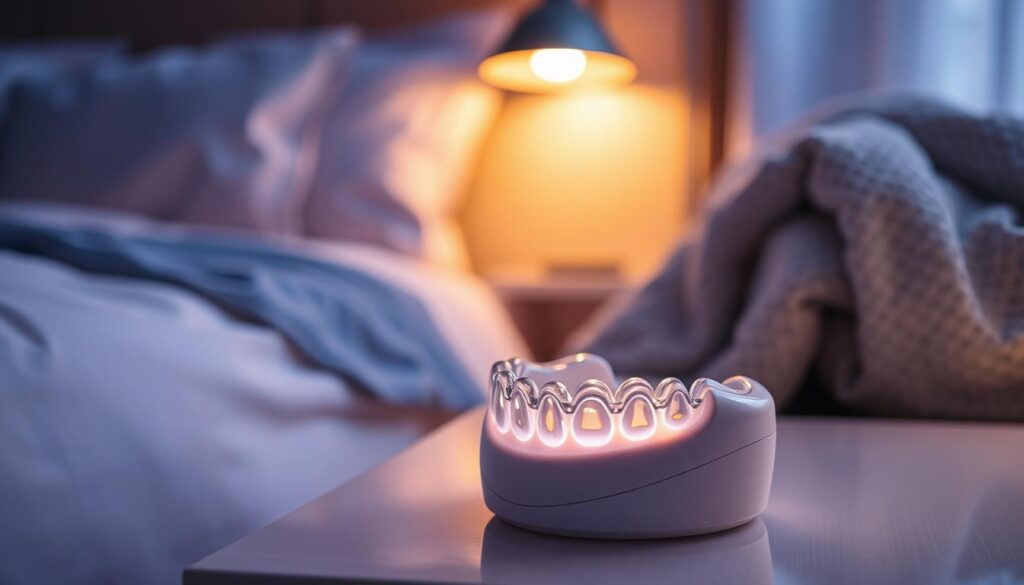
Night guards are key for those wanting to protect their teeth and boost their oral health. Knowing the benefits, types, and care of night guards can help those with bruxism or dental issues.
Night guards do more than just protect teeth. They stop tooth wear and jaw pain from grinding. They also improve sleep by reducing grinding noises. Plus, they safeguard dental work like fillings and crowns, keeping your mouth healthy for longer.
There are many night guards for different needs. Soft guards are good for light grinding. Hard guards are for serious grinding. Dual-laminated guards offer both soft and hard materials, making them versatile for any grinding level.
Keeping your night guard in top shape is key. Clean it with mild soap and water every day. Store it in a case to avoid damage. Regular dental visits help check its condition and ensure it's doing its job.

| Type of Night Guard | Best For | Material | Advantages |
|---|---|---|---|
| Soft Guard | Mild Bruxism | Flexible Material | Comfortable fit, easy to wear |
| Hard Guard | Severe Bruxism | Rigid Material | Durable, withstands high pressure |
| Dual-Laminated Guard | Mixed Levels of Bruxism | Combination of Soft and Hard | Comfort and durability combined |
Night guards are key for keeping teeth healthy, especially for those with bruxism. They act as a shield against tooth damage and help you sleep better. Knowing the different types and their benefits helps you choose the right one for your teeth.
Night guards do more than just protect teeth; they're part of a good oral health plan. Taking care of them makes them last longer and work better. Getting a good night guard is good for your teeth and overall health.
Using night guards is a smart move for dental care. They're not just a quick fix but a big step towards better health. For those with tooth grinding or at risk, a night guard is a way to improve your life and feel more at ease.
Night guards are custom dental devices that fit over your teeth. They act as a protective barrier against grinding and clenching during sleep. This helps prevent damage from bruxism, which can wear down tooth enamel and lead to dental problems.
If you suffer from bruxism, you may experience fractured teeth, jaw pain, and headaches. Night guards absorb the pressure created during grinding. This alleviates these symptoms and protects your oral health.
Individuals with symptoms of bruxism, such as worn enamel, tooth sensitivity, or jaw discomfort, should consider night guards. Those with a family history of teeth grinding or sleep-related chewing habits are also at a higher risk and may benefit from using them.
Night guards can prevent tooth wear, alleviate jaw pain, and improve sleep quality. They minimize disturbances caused by grinding. They also protect existing dental work, such as fillings and crowns, promoting long-term oral health.
Common types of night guards include soft guards for mild bruxism and hard guards for more severe cases. Dual-laminated guards combine both materials for enhanced protection and comfort.
Proper hygiene is essential. Clean your night guard daily with mild soap and water. Store it in a protective case when not in use. Regular dental visits are recommended to monitor the condition and ensure its effectiveness.
Yes, night guards can improve sleep quality. They reduce the discomfort associated with bruxism, leading to fewer disturbances throughout the night. This contributes to a more restful and uninterrupted sleep experience.
Generally, night guards are considered safe. However, improper fitting may lead to discomfort or jaw issues. It's important to consult with a dental professional to ensure you receive a properly fitted night guard tailored to your specific needs.
Keeping your smile bright and confident is more than just one teeth whitening treatment. To get the best results, you need to follow good teeth whitening maintenance tips. This guide will show you how to keep your teeth white and make your whitening last longer.
It's important to understand the role of oral hygiene and make better food choices. These tips can greatly improve how long your whitening lasts.
Keeping your mouth clean is key to keeping your teeth white. Good oral hygiene makes your smile brighter and keeps your teeth healthy. Brushing right, choosing the right toothpaste, and flossing daily are all important for whitening your teeth.
Brushing twice a day is the first step to clean teeth. It removes plaque and stops stains from forming. Use gentle, circular motions to clean all tooth surfaces without harming the enamel.
Whitening toothpaste offers big benefits. It has mild abrasives that remove stains and polish teeth. Using it regularly keeps your teeth bright, even after professional whitening.
Flossing is very important. It cleans between teeth where a toothbrush can't reach. This helps keep your teeth white and gums healthy. Flossing daily is good for your teeth and gums.
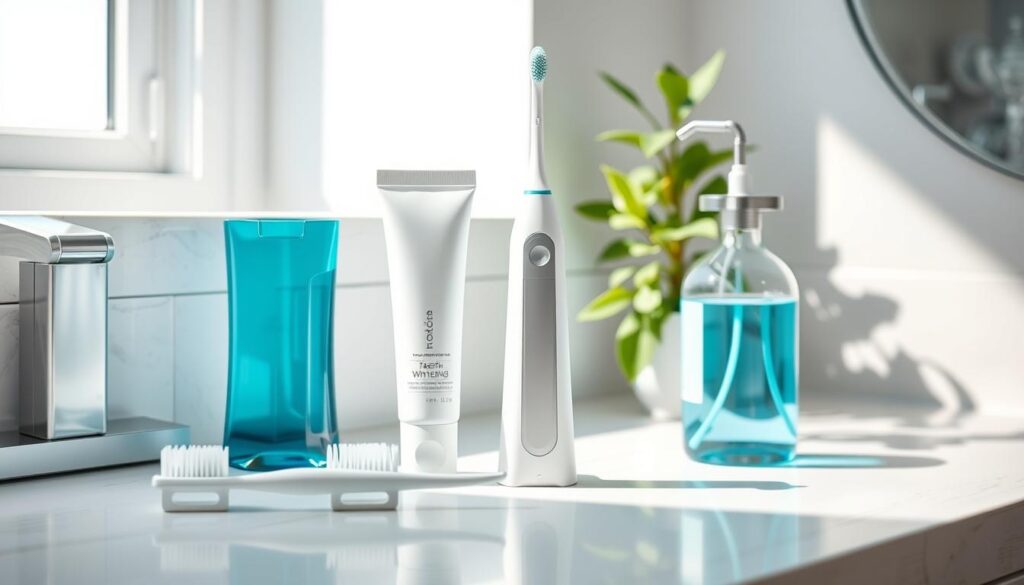
| Practice | Description | Benefits |
|---|---|---|
| Brushing Techniques | Brush at least twice a day using circular motions. | Removes plaque, prevents stains, promotes dental health. |
| Whitening Toothpaste | Use toothpaste designed to remove surface stains. | Helps maintain brightness from whitening treatments. |
| Flossing | Floss daily to clean between teeth. | Improves gum health and maintains teeth whiteness. |
To keep your smile bright, watch what you eat and drink. Foods and drinks that stain can make your teeth dull faster. Smoking also harms your efforts to keep teeth white. Paying attention to these can help your whitening last longer.
Some foods that stain teeth can be hard to avoid. Common ones include:
Drinking these in small amounts can help. Water can wash away stains from drinks that yellow teeth.
Smoking badly affects your teeth. It stains them and harms your health. It also leads to gum disease and bad breath. Knowing how tobacco and oral health are linked can help you quit and keep your teeth white.

Keeping your teeth white is key to a bright smile. Good oral hygiene, like brushing with whitening toothpaste, helps a lot. Flossing also stops plaque, keeping your teeth white longer.
What you eat matters too. Eating less food that stains teeth is important. And, quitting tobacco is crucial to keep your teeth white.
Don't forget to see your dentist regularly. They help keep your teeth healthy and your smile bright. By following these tips, you can have a beautiful smile for a long time.
To keep your teeth white, brush them at least twice a day with whitening toothpaste. Don't forget to floss daily. This removes food and plaque, preventing stains.
For whitening, use a whitening toothpaste and brush in circular motions. Floss every day. These steps remove plaque and stains, keeping your teeth bright.
Avoid foods and drinks that stain teeth, like red wine, coffee, and berries. Soda and beets also cause stains. Choosing what you eat can help keep your teeth white longer.
Smoking can ruin your teeth's brightness. Nicotine and tar cause discoloration. Quitting smoking is key to a whiter, healthier smile.
See your dentist every six months for check-ups and cleanings. These visits keep your teeth healthy and your whitening results lasting.
Yes, whitening toothpaste can noticeably brighten your teeth. They have mild abrasives that remove stains. Adding them to your routine supports lasting whitening.
Missing teeth can really affect your health and how you feel about yourself. It's important to get missing teeth treatment quickly to fix both looks and function. In Turkey, there are many dental solutions to help people feel better about their smiles.
This article will talk about the top ways to fix missing teeth. We'll look at dental implants, dental bridges, and dentures. We want to help you choose the best option for you.
Treating missing teeth is key for good oral health. It also boosts self-confidence and makes our smiles look better. Catching gaps early can stop big problems and improve our lives. If we ignore missing teeth, it can harm our looks, wallet, and happiness.
Missing teeth mess up our mouth's balance, causing teeth to wear down faster. This can lead to more dental issues. Gaps also let bacteria in, raising the risk of gum disease and other problems. Without teeth, our jaw can change, making dental problems worse.
Not having teeth can really hurt how we feel about ourselves. Many people feel shy about their looks, especially when smiling. This can make them shy away from social and work situations.
Not fixing missing teeth can lead to big health problems and higher costs. Untreated gaps can turn into serious dental issues, needing expensive fixes or even tooth removal. Delaying treatment can cost a lot, making it important to act fast. Fixing gaps early keeps our teeth healthy and saves money on future dental bills.
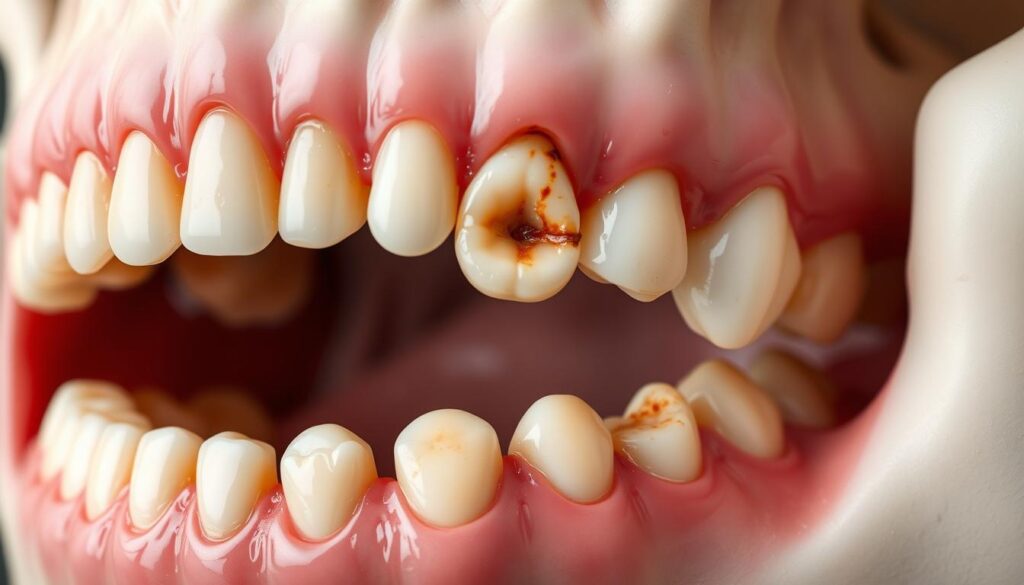
Missing teeth can affect how we look and how we eat. There are many ways to fix this, like dental implants, bridges, dentures, and new methods like All-On-4 implants. Each option has its own benefits, so it's important to find the right one for you.
Dental implants are the top choice for replacing teeth. They involve a titanium post in the jawbone that gets stronger over time. Implants are durable, look natural, and help keep the jawbone strong. They are a reliable way to fill gaps for good.
Bridges are a good option for gaps in teeth. They use artificial teeth held by crowns on nearby teeth. Bridges help with chewing and speaking and make your face look better. They're less invasive than implants but don't stop jawbone loss.
Dentures are a cheaper way to replace many teeth or all of them. They come as partial dentures or full dentures. Dentures can make your mouth work better and look nicer. But, they need regular care and fitting to stay comfortable.
All-On-4 implants are a new way to fix a full set of teeth. They use just four implants to hold a full set of teeth. This method is quick, often done in one visit, and can be less painful than traditional implants. It's a great option for those wanting a fixed solution.
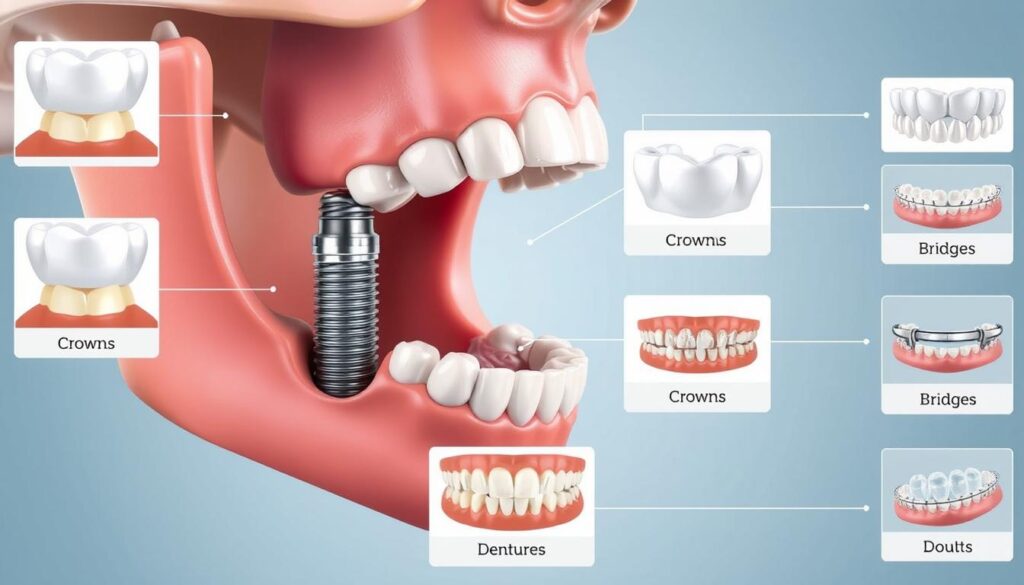
| Treatment Option | Description | Benefits | Considerations |
|---|---|---|---|
| Dental Implants | Permanent tooth replacement with a titanium post. | High durability, aesthetics, stimulates bone. | Requires surgical procedure, may involve higher initial cost. |
| Bridges | Fixed prosthesis anchored on adjacent teeth. | Restores function, maintains facial contour. | May not prevent bone loss, requires healthy adjacent teeth. |
| Dentures | Removable prosthetics for partial or full tooth loss. | Cost-effective, restores mouth functionality. | Requires maintenance, may need adjustments. |
| All-On-4 Implants | Fixed restoration supported by four implants. | Quick recovery, less discomfort, immediate results. | Specific candidacy requirements, initial investment may be high. |
Fixing missing teeth is key for keeping your mouth healthy and your smile bright. Without teeth, eating, talking, and feeling good about yourself can be tough. Luckily, there are many ways to fix missing teeth, like implants, bridges, dentures, and All-On-4 implants. Each one fits different needs and budgets.
Looking to fix your smile? It's smart to check out all your options and talk to dentists in Turkey. They can help you choose the best treatment for you. This way, you can get back to eating and smiling like you used to.
In short, fixing missing teeth is very important. By choosing the right treatment, you can make your mouth healthier and feel better about yourself. So, don't wait to get help and find a way to make your smile shine again!
There are several ways to replace missing teeth. Dental implants, bridges, and dentures are the main options. They help you smile with confidence and keep your mouth healthy.
Dental implants are a surgical process. A titanium post is placed in the jawbone. It acts as a tooth root, blending with the bone for a strong base.
Dental bridges work well for many people. They need healthy teeth next to them for support. But, they don't stop bone loss. Always talk to a dentist about your needs.
Dentures come in two types. Partial dentures fit those with some teeth left. Complete dentures are for those without any teeth. Both help you smile and eat better without surgery.
All-On-4 implants use four implants to support a full set of teeth. This method offers a full smile in one visit. It's faster and gives immediate results.
Fixing missing teeth quickly is key. It prevents gum disease, misaligned bites, and bone loss. Waiting can lead to more complicated and costly treatments.
Missing teeth can hurt your self-esteem and confidence. Many feel embarrassed about their smiles. This can make socializing hard. Finding a dental solution is important for your smile and self-confidence.
Yes, dentures and bridges are cheaper than implants. They offer great benefits. But, think about comfort and upkeep when choosing a treatment.
Tooth sensitivity is a common dental issue that can cause a lot of pain. This pain is especially sharp when you eat or drink hot or cold things. It can make eating and drinking less enjoyable, affecting your life quality.
It's important to understand what causes tooth sensitivity and how to treat it. We will look at different ways to manage and relieve dental discomfort. This includes various methods for treating tooth sensitivity.
Tooth sensitivity can be quite distressing and often arises from a few significant factors. Identifying the causes of tooth sensitivity is essential for effective management. This condition affects individuals differently, with various symptoms indicating the underlying issues.
Several factors can lead to tooth sensitivity, which primarily revolves around the exposure of dentin, the sensitive inner layer of the tooth. Key causes include:
Recognizing the symptoms of tooth sensitivity is crucial for addressing the issue promptly. Common symptoms include:
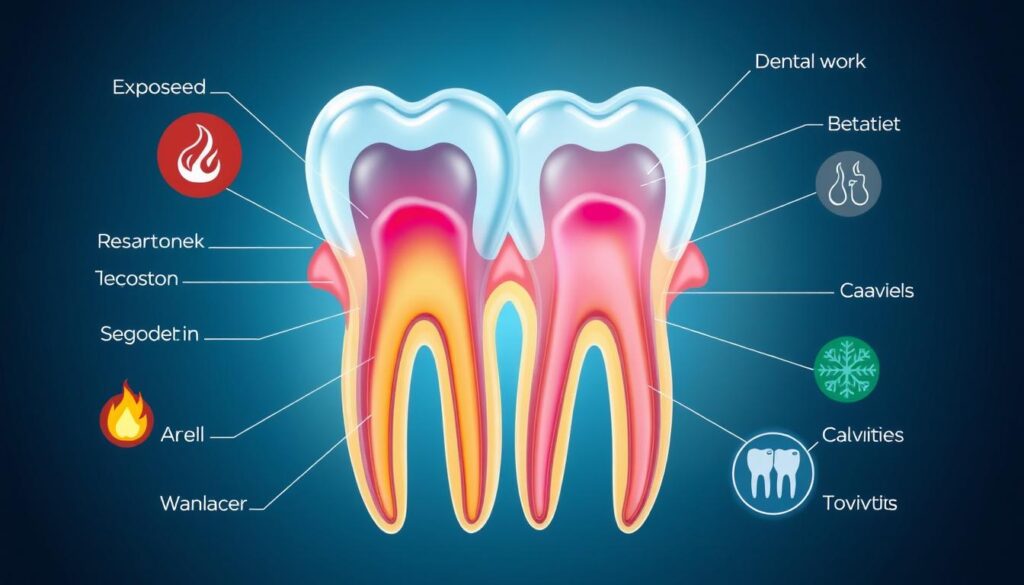
Managing tooth sensitivity can boost your oral health and comfort. There are many options, from OTC treatments to dental care. Knowing these choices helps you pick the best for you.
OTC tooth sensitivity treatments offer quick relief. Desensitizing toothpaste is a top pick because it targets nerve sensitivity. Other items include:
These solutions are easy to find and can greatly improve your daily comfort if you have tooth sensitivity.
For lasting tooth sensitivity, you might need dental care. Dentists offer many treatments to fix the root cause. Common ones are:
Working with a dentist ensures your treatment fits your specific needs and dental issues.
Preventing tooth sensitivity starts with good oral hygiene. Keeping your teeth and gums healthy is key. Use the right brushing techniques and follow a daily dental care routine.
Good oral hygiene is a must for everyone. Here are some important steps:
Choosing the right toothpaste is crucial. Look for these options:
Read toothpaste labels and pick what's best for you to manage sensitivity.
Some habits can make tooth sensitivity worse. Here are habits to avoid:
Staying away from these habits can help prevent or reduce tooth sensitivity.
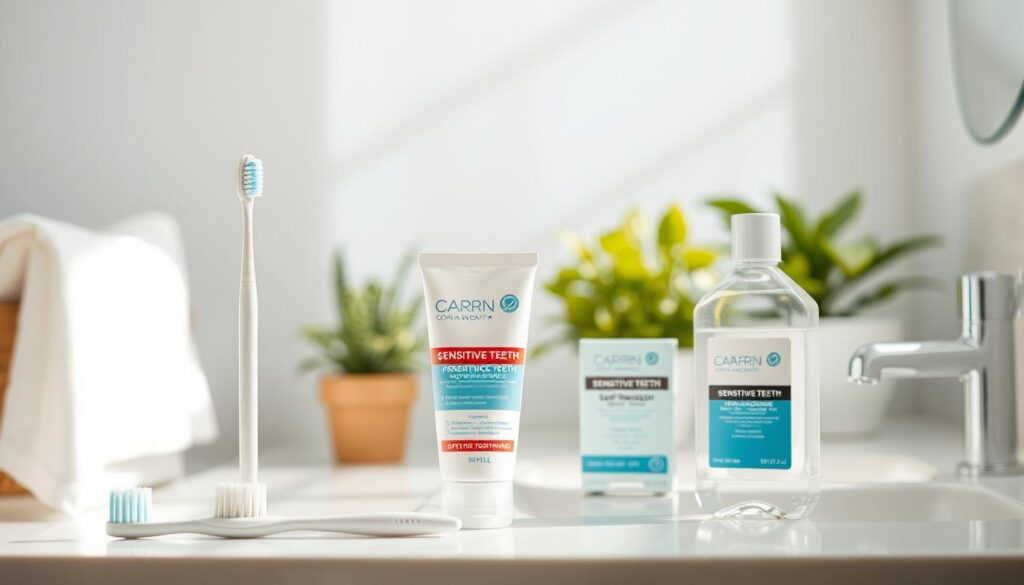
| Oral Care Practice | Benefits |
|---|---|
| Brushing with fluoride toothpaste | Strengthens enamel and reduces sensitivity |
| Flossing Daily | Prevents plaque buildup and gum disease |
| Regular Dental Check-Ups | Catches early signs of sensitivity and decay |
| Using a Night Guard | Protects teeth from grinding damage |
Dealing with tooth sensitivity is key to a better life and enjoying daily activities without pain. Knowing what causes it helps people use both over-the-counter and dental treatments to feel better. This way, they not only ease the pain but also keep their teeth healthy for a long time.
To manage dental pain, one must be careful and proactive. Keeping teeth clean, using the right toothpaste, and avoiding bad habits like grinding teeth are important. These steps help prevent problems and keep teeth healthy.
In the end, a mix of education, practical steps, and prevention is the best way to handle tooth sensitivity. By making these habits part of daily life, people can look forward to a future with less pain and more confidence. This changes how they see their dental care journey.
Tooth sensitivity is a common dental issue. It causes sharp pain or discomfort when eating or drinking hot, cold, or sweet things. This usually happens when the dentin is exposed.
Tooth sensitivity can be caused by several things. Enamel erosion and gum recession are common. Dental procedures like whitening or fillings can also cause it. Cracked teeth that expose nerves are another reason.
To manage tooth sensitivity at home, use desensitizing toothpaste. Fluoride treatments can also help. Avoid foods and drinks that are too hot or cold. Good oral hygiene is key to feeling better.
See a dentist if your tooth sensitivity doesn't go away or gets worse. Also, if you have swelling or bleeding, it's a sign of a bigger problem.
Dentists offer several treatments for tooth sensitivity. Fluoride varnishes and dental bonding can seal exposed areas. Root canal therapy is needed for severe nerve pain.
Yes, use desensitizing toothpaste. Look for toothpaste with potassium nitrate or fluoride. These ingredients help block nerve impulses and strengthen enamel.
To prevent tooth sensitivity, avoid grinding your teeth too much. Don't use harsh toothbrushes or whitening products. Regular dental check-ups are also important.
Yes, eating too many acidic foods and drinks can harm your teeth. It can lead to enamel erosion and sensitivity. Try to eat a balanced diet to protect your teeth.
In the world of orthodontic treatment, metal braces and clear aligners are big choices. Both help fix teeth that don't line up right and make your smile better. But they work in very different ways.
Metal braces are old-school. They use brackets and wires to slowly move your teeth into place. Clear aligners, on the other hand, are new and easy to use. They are removable trays that are less noticeable.
This article will explore what makes each option special. We'll look at their good points and bad points. This will help you decide if metal braces or clear aligners are right for you.
Metal braces are a common orthodontic device for fixing teeth and bites. They have many parts that work together to straighten teeth. Knowing about metal braces helps people make better choices for their teeth.
Metal braces are a fixed appliance for teeth alignment and bite correction. They have metal brackets attached to teeth and wires that connect them. Orthodontists adjust these wires to move teeth into the right place.
Stainless steel is often used. The components of metal braces also include elastic bands for better tension. This method works well for many patients, fixing issues like overcrowding and gaps.
Metal braces have many benefits, making them a top choice for many. Some key advantages are:
Despite their benefits, metal braces have some downsides. Common issues include:

When comparing metal braces and clear aligners, several key factors come into play. These include treatment duration, comfort, maintenance needs, and cost. Each option has its own set of advantages and limitations, affecting the orthodontic experience and results.
Metal braces usually take 18 months to 3 years to complete, depending on the case. They are effective for severe orthodontic issues due to constant pressure. Clear aligners, however, take 12 to 18 months and are better for mild to moderate cases.
Comfort is a big factor. Invisible aligners are often more comfortable because they're custom-made and don't have sharp edges. Yet, some might feel mild discomfort as their teeth adjust. Clear aligners are nearly invisible, making them popular among adults and teens who don't want metal braces.
Metal braces need special care to avoid damage and keep them clean. You must follow dietary restrictions and brush well to prevent plaque. Clear aligners, on the other hand, can be removed for meals, making cleaning easier. It's crucial to brush after meals to keep them clear and prevent food trapping.
The cost of clear aligners versus metal braces is a big consideration. Metal braces are generally cheaper, costing between $3,000 and $7,000. Clear aligners, like Invisalign, cost between $4,000 and $8,000. Insurance may help cover some costs, but personal finances often decide the choice.

| Feature | Metal Braces | Clear Aligners |
|---|---|---|
| Treatment Duration | 18 months to 3 years | 12 to 18 months |
| Effectiveness | Best for severe cases | Better for mild to moderate cases |
| Comfort Levels | Less comfortable, can cause irritation | More comfortable, custom-fitted |
| Aesthetic Considerations | Noticeable | Virtually invisible |
| Maintenance | Dietary restrictions | Can be removed for eating |
| Cost | $3,000 to $7,000 | $4,000 to $8,000 |
Choosing between metal braces and clear aligners depends on many factors. These include the dental issue's complexity, personal comfort, aesthetic desires, maintenance needs, and budget. Metal braces are great for serious orthodontic problems.
Clear aligners are a good choice for those with mild to moderate dental issues. They are less visible, making them popular for those who want to keep a natural look. So, it's key to think about all these factors carefully.
Talking to a qualified orthodontist is essential. They help you make a choice that fits your needs and situation. This way, you can pick the best option for your perfect smile.
Metal braces are traditional orthodontic devices. They have metal brackets on the teeth and wires that connect them. An orthodontist adjusts these wires to align teeth and fix bite issues.
Metal braces are great for severe orthodontic cases. They are durable and need fewer adjustments than clear aligners. They're effective for complex issues like overcrowding and malocclusions.
Metal braces are visible, which might be a drawback. They can be uncomfortable after adjustments. Also, keeping them clean is hard because food can get stuck in the brackets.
Metal braces take 18 months to 3 years. Clear aligners usually need 12 to 18 months. This depends on the dental issues being treated.
Clear aligners are often more comfortable. They fit well and don't have sharp edges like metal braces. But, some discomfort may still happen as they apply pressure to move teeth.
Metal braces need special care to avoid damage. You must be careful with dental hygiene to prevent plaque. Clear aligners can be removed for eating and cleaning. But, remember to brush your teeth after meals.
Metal braces are generally cheaper, costing between ,000 and ,000. Clear aligners, like Invisalign, cost between ,000 and ,000. This depends on your treatment needs and how long it lasts.
Metal braces are best for complex cases. They apply consistent pressure for effective treatment of severe misalignment and bite issues.
Yes, adults can use both metal braces and clear aligners. Clear aligners are popular for their look. Metal braces are reliable for effective correction.
Gum recession happens when gum tissue pulls away from teeth. This can expose more of the tooth root. It can cause sensitivity, decay, and even tooth loss. Getting the right gum treatment is key for both looks and health.
This article will look at gum recession solutions in Turkey and worldwide. We'll cover both non-surgical and surgical methods. Knowing these options can help you take care of your teeth and smile better.
Gum recession is a common issue that can signal bigger dental problems. Knowing what it is, why it happens, and why it needs treatment is key to good dental care.
Gum recession happens when gums pull back, showing the tooth roots. It can affect anyone, but it's more common in older adults. The exposed roots make teeth more prone to gum disease and pain.
Many things can cause gum recession. Here are some main reasons:
Treating gum recession is vital to avoid bigger dental problems. If left untreated, it can lead to:
Spotting gum recession early and treating it can greatly improve dental health. Regular dental visits are key. Good dental care can also stop this problem from getting worse.
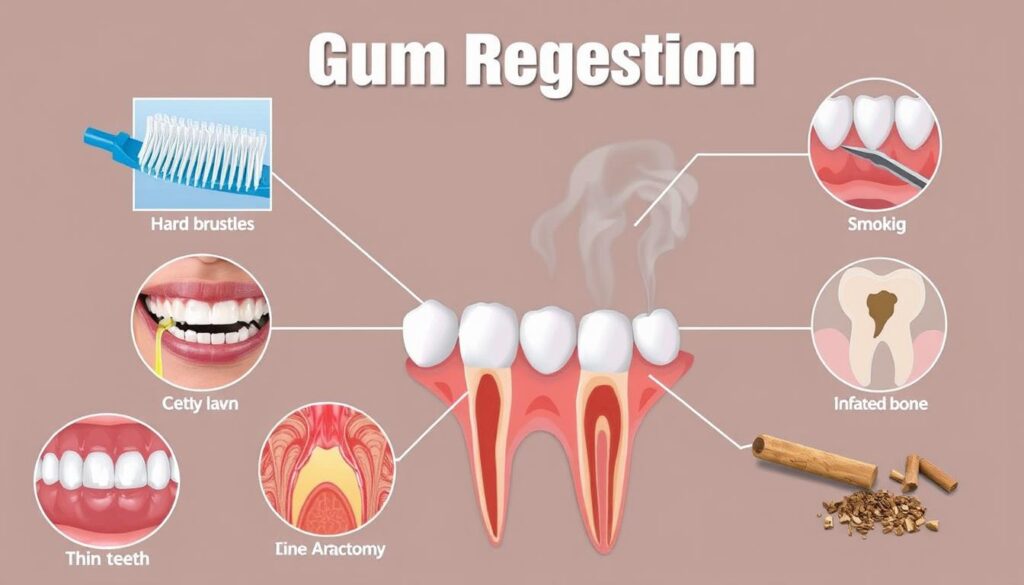
| Sign of Gum Recession | Description |
|---|---|
| Tooth Sensitivity | Increased discomfort when eating hot or cold foods. |
| Visible Tooth Roots | Sections of the tooth root becoming exposed. |
| Lengthening Tooth Appearance | Teeth look longer because the gums are shrinking. |
| Pocket Formation | Spaces between gums and teeth where bacteria can build up. |
Gum recession can cause many problems if not treated. But, there are many ways to fix it. Knowing about these treatments helps people take care of their teeth better.
Non-surgical treatments aim to stop gum recession and improve mouth health. They include:
Seeing a periodontist regularly helps control plaque and bacteria. This can ease the pain of gum recession.
For serious gum recession, surgery like gum grafting is needed. This involves:
The American Academy of Periodontology says these surgeries can greatly improve gum health. They help restore function and look to the gums.
Good oral care at home is key for gum health. Ways to do this include:
These steps can help stop gum recession and keep gums healthy for a long time.

Gum recession is a common problem that affects dental health and overall well-being. Knowing about different treatments helps people make better choices for their teeth. Early action is key to fixing gum recession, making regular dental visits important.
Good oral hygiene is crucial to stop gum recession and improve life quality. Brushing right and using mouthwash can help a lot. Many people also look into dental care in Turkey for its advanced techniques.
Being proactive about dental care and choosing the right treatments helps manage gum recession. By focusing on dental health, people can feel better about their smiles and keep their teeth healthy for a long time.
Gum recession can be caused by periodontal disease and aggressive brushing. Hormonal changes and tobacco use also play a role. Genetic factors and teeth grinding can contribute too.
Look for signs like visible tooth roots and increased sensitivity. If your gums pull away from your teeth, that's a sign too. Regular dental visits can catch it early.
Non-surgical options include dental cleanings and scaling. Antimicrobial mouth rinses and desensitizing toothpaste can help with pain.
Surgery, like gum grafting, is needed for severe cases. It's for when a lot of tissue is lost or roots are exposed. The goal is to fix both looks and function.
Keep your teeth clean with a soft toothbrush and floss daily. Eat foods rich in vitamins C and D. Avoid tobacco and manage stress.
Treating gum recession early stops bigger problems like cavities and tooth loss. It keeps your teeth and gums healthy for longer.
Regular dental visits help catch gum recession early. Dentists can clean and treat your teeth to keep them healthy.
In today's world, looking good and having healthy teeth is more important than ever. This makes adult orthodontics a big deal for many. In Turkey, especially, more adults are looking for ways to improve their smile and dental health.
Those who didn't take care of their teeth when they were younger are now looking into modern orthodontic treatments. They want to fix issues like crowded teeth and bad bites. Knowing what dental problems adults face is key to finding the right treatment.
Many adults deal with dental problems that affect their daily life. Issues like overcrowded teeth, gaps, and crossbites are common. Fixing these problems is key for both looks and health.
Adults often face:
These problems can cause serious dental issues if not treated. Misaligned teeth can lead to gum disease, tooth decay, and jaw pain.
Misaligned teeth have more than just cosmetic effects. Studies show they increase the risk of dental problems. This can start a cycle of discomfort and more dental issues.
Fixing these issues has many benefits. It improves oral hygiene, reduces dental disease risk, and enhances chewing and speaking.
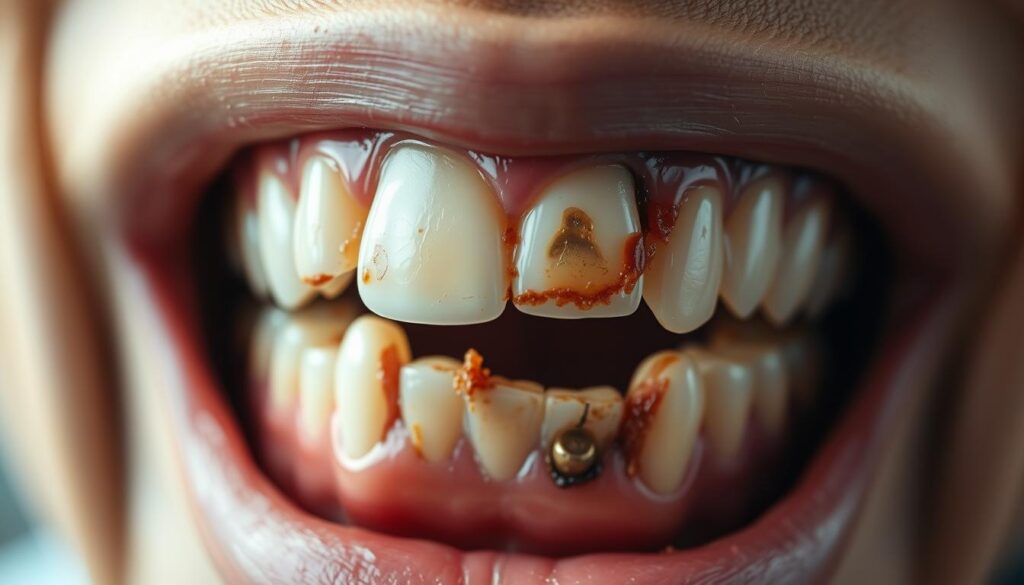
In summary, knowing about dental issues in adults and their effects is vital. Seeking orthodontic treatment is crucial for good oral health and a better life.
Adults looking to improve their smile and oral health have many options. From traditional braces to clear aligners, there's something for everyone. Each choice has its own benefits, helping you find the best fit for you.
There are several orthodontic solutions to choose from. You can pick from metal braces, ceramic braces, or clear aligners like Invisalign. Metal braces are strong and good for complex cases. Ceramic braces are less noticeable. Clear aligners are almost invisible, perfect for those who care about looks.
Choosing orthodontic treatment is a personal decision. You need to think about your lifestyle, budget, and dental needs. Clear aligners are flexible, while traditional braces might need more visits.
Talking to an orthodontist can help. They can explain the pros and cons based on your situation. This way, you can make a choice that's right for you.
Some think it's too late for orthodontic care as an adult. But, early treatment can lead to quicker results and fewer problems. Adult treatments are designed for busy lives, making them less noticeable.
Getting orthodontic care, no matter your age, is important. It can greatly improve your smile and confidence in the long run.
Adults often face dental problems like overcrowding and gaps between teeth. They may also have crossbites and misaligned bites. These issues can cause gum disease, tooth decay, and jaw pain. That's why they need good orthodontic care.
Orthodontic treatment for adults can improve dental alignment and oral health. It can also boost self-confidence and relieve bite-related discomfort. This can lead to better oral health in the long run.
Adults have many orthodontic options. These include traditional metal braces, ceramic braces, and clear aligners like Invisalign. Each option has its own look and function, fitting different needs and lifestyles.
To pick the right treatment, think about your dental issues, lifestyle, budget, and what you like. Talking to an orthodontic specialist can help. They can find the best option for you based on your needs.
Getting treatment early can make it simpler and prevent future problems. Adult treatments can be adjusted for work and personal life. The best choice depends on your dental needs.
Keeping teeth healthy in kids is key to their overall health. Teaching them good tooth care habits is vital. It helps them develop healthy habits for life.
By focusing on kids' dental care, parents can teach them how to take care of their teeth. This is important because it affects their smile and confidence. It also impacts their quality of life.
Dental health is key for a child's overall health. Parents can help their kids keep their teeth healthy. This is important for preventing cavities and boosting confidence.
Good oral hygiene from the start has many benefits. Brushing and flossing regularly can prevent cavities and gum disease. Some main advantages are:
These benefits can lead to lifelong healthy habits.
Poor oral hygiene can lead to serious problems. It can affect dental health and overall well-being. The effects can range from mild issues like bad breath to severe conditions, such as:
Poor dental care can cause painful infections and affect eating and speaking. It can also lead to expensive treatments. Knowing these risks highlights the need for consistent oral care for kids.

Keeping kids' teeth healthy is more than just brushing at home. Regular dental visits are crucial. These visits, every six months, check on their teeth and gums. They also teach families how to keep teeth healthy.
Children need regular dental visits to avoid cavities. A pediatric dentist can apply fluoride treatments to strengthen teeth. These visits catch problems early and teach good oral hygiene habits.
Fluoride treatments help teeth resist decay. Dental sealants protect molars from cavities. Studies show sealants can cut tooth decay by nearly 80% in kids.
Choosing the right toothbrush and toothpaste is key. Opt for a soft-bristled toothbrush and fluoride toothpaste. The American Dental Association says this reduces cavities. Supervise brushing until they're 7 to teach them how to do it right.
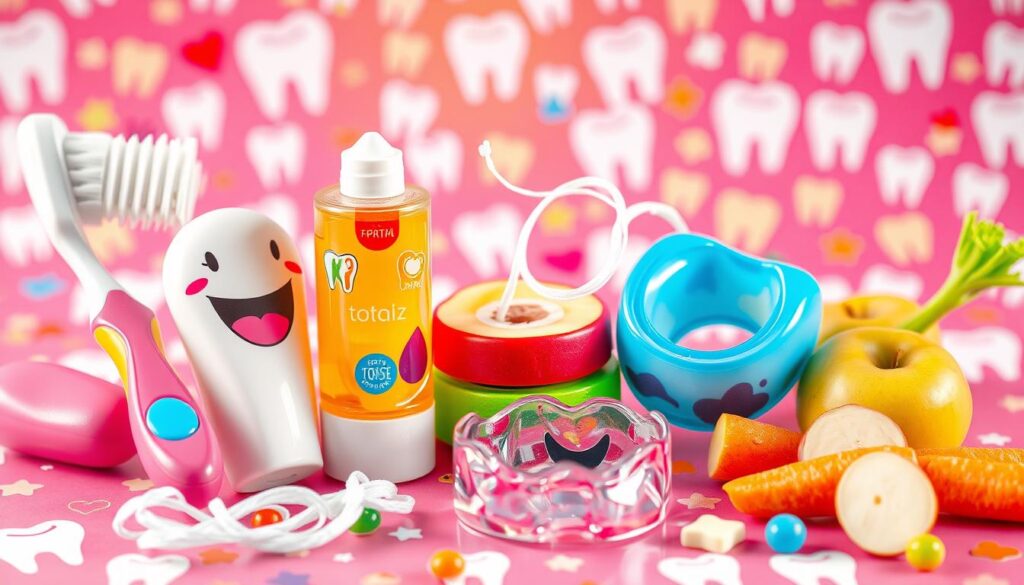
| Method | Description | Benefits |
|---|---|---|
| Regular Dental Check-ups | Routine visits to a pediatric dentist | Early detection of dental issues |
| Fluoride Treatments | Application of fluoride to strengthen enamel | Prevents cavities effectively |
| Dental Sealants | Covers chewing surfaces of back teeth | Reduces risk of decay by 80% |
| Choosing Toothbrush and Toothpaste | Soft-bristled toothbrush and fluoride toothpaste | Promotes effective cleaning and cavity prevention |
Teaching kids good dental habits at home is key to avoiding dental problems. By making oral care fun, parents can help kids develop lasting habits. This can greatly improve their oral health for years to come.
Make brushing teeth a fun activity for kids. Let them choose their toothbrush and toothpaste flavors. Use timers or songs to turn it into a game.
Being consistent is important. It helps kids remember to brush every day. This routine is crucial for their oral health and diet.
Nutrition and dental health are closely linked. Choose healthy snacks for kids, like fruits, veggies, and nuts. Avoid sugary or acidic foods.
Snacks like apple slices and carrot sticks are great for teeth and gums. The Academy of Nutrition and Dietetics says balanced nutrition is key for oral health. These choices can help prevent cavities and tooth decay.
It's crucial for parents to start early with tooth protection for kids. Knowing how to keep their teeth clean is key. This includes regular dental visits, fluoride treatments, and the right toothbrushes and toothpaste.
Teaching kids to brush their teeth daily and eat healthy snacks is vital. These habits help them take care of their teeth and grow up with a healthy smile. Parents are key in teaching these habits.
Parents in Turkey should look for reliable dental care advice. Staying updated on dental health is important. This way, families can ensure their kids have healthy teeth for life. Starting early with dental care is the best way to protect their teeth.
For your child's dental health, regular dental check-ups every six months are key. Make sure they brush their teeth daily with fluoride toothpaste. Also, consider dental sealants and fluoride treatments for extra protection.
Children should see their pediatric dentist every six months. These visits help keep their teeth healthy. They also catch problems early and offer treatments to prevent bigger issues.
For kids, use toothpaste with fluoride but no artificial colors or flavors. Choose a soft-bristled toothbrush that fits their mouth well. Always pick dental products made for kids' needs.
Healthy snacks for dental health include crunchy fruits and veggies like apples and carrots. Nuts and yogurt are also good. These snacks help prevent cavities and support overall health.
Ignoring dental care can cause cavities, gum disease, and orthodontic problems in kids. It can lead to painful infections and make eating and speaking hard. It also means higher costs for dental treatments later on.
To make brushing teeth fun, let your child pick their toothbrush and toothpaste. Use timers or songs to make it a game. This positive approach helps them develop good dental habits for life.
Yes, fluoride treatments and dental sealants are very good for kids. Fluoride makes teeth stronger and fights decay. Sealants cover molars, cutting cavity risk by nearly 80% in kids.
For those who have lost their teeth, finding dentures that fit right is key. Comfortable dentures bring back the joy of eating and talking. They make life better. This part will talk about how to get dentures that fit well and offer tips for comfort.
Complete dentures are a key solution for those who have lost all their teeth. Knowing what complete dentures are is crucial for those thinking about them. They are made to fit over the gums, looking like real teeth and gums.
Complete dentures help restore function and look for those missing all teeth. Made from materials like acrylic or metal, they fit each person perfectly. This allows users to eat, speak, and smile with confidence.
People choose complete dentures for many reasons, including:
Complete dentures offer many benefits, like better oral function and a more attractive face.
Knowing about denture parts helps users care for them better. Complete dentures have two main parts:
| Component | Description | Material |
|---|---|---|
| Base | Replicates natural gums | Acrylic resin |
| Denture Teeth | Artificial teeth that mimic natural appearance | Acrylic or porcelain |
This info shows how these parts work together for function and beauty in dentures.
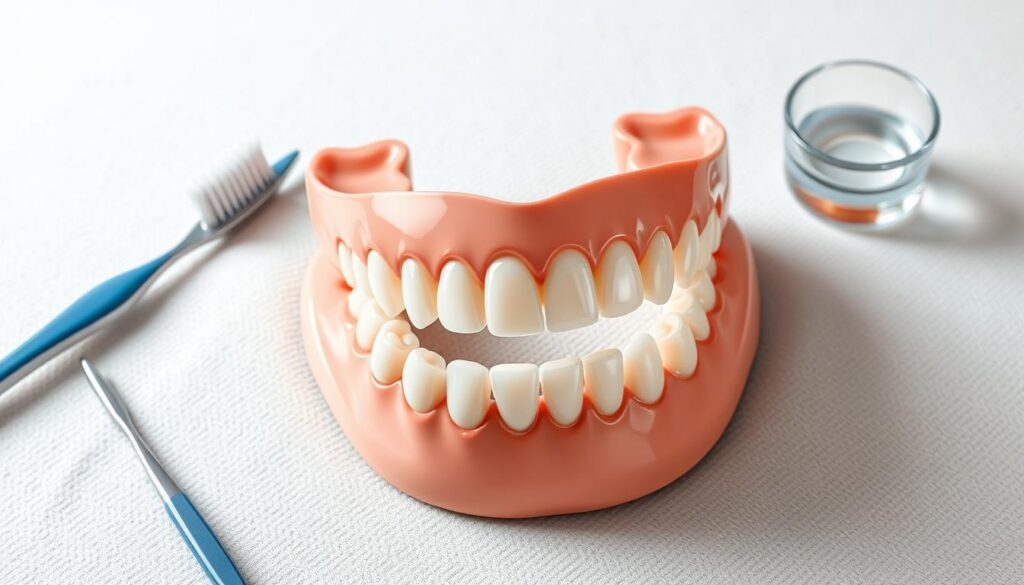
Wearing complete dentures should be comfortable. Several factors affect how well dentures fit and feel. It's important for both new users and those with discomfort to understand these factors.
Many things can impact how comfortable dentures are. These include:
To make dentures more comfortable, try these tips:
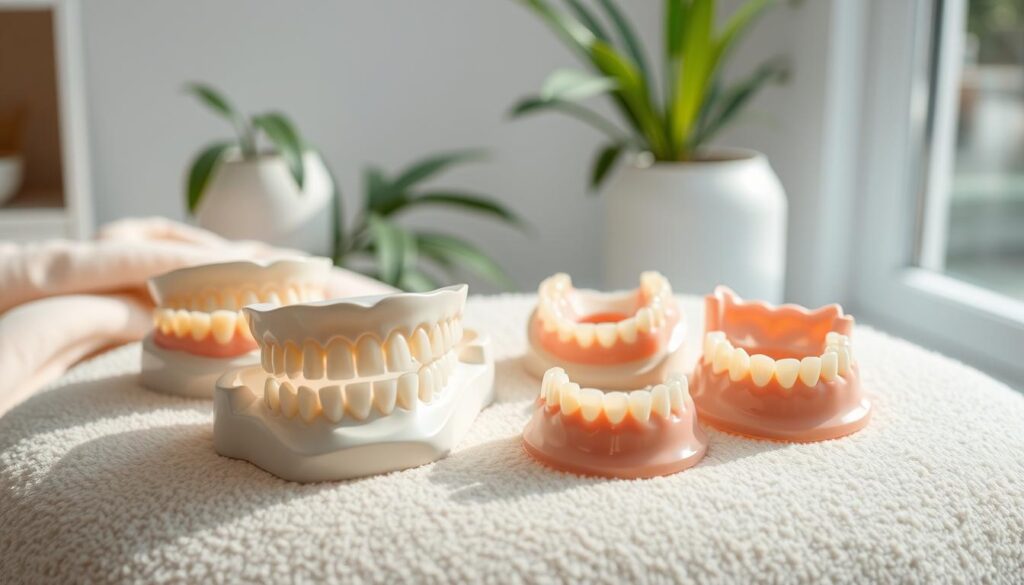
| Factor | Impact on Comfort | Recommended Action |
|---|---|---|
| Denture Fit | Poor fit can lead to irritation and sores | Regular adjustments by a dental professional |
| Material Quality | Influences durability and comfort | Choose high-quality denture materials |
| Oral Health | Affects the overall fitting and comfort | Maintain oral hygiene and regular check-ups |
Using complete dentures can lead to irritation and soreness. Many people face discomfort due to mouth friction. To solve these problems, it's important to know how to handle denture irritation, clean them right, and get used to eating with them.
Denture sores often happen when dentures don't fit right or move too much while chewing. To lessen discomfort, try these steps:
Cleaning your dentures well is key for good oral health. Using the right cleaning methods helps keep dentures in good shape and makes them more comfortable. Here are some important tips for cleaning your dentures:
Many people struggle to get used to eating with dentures. To make eating more comfortable, follow these tips:
In short, dealing with denture sores and keeping dentures clean can greatly improve your experience. Finding a comfortable way to eat helps you adjust to wearing dentures.
Understanding dentures is key to using them confidently. We've covered the basics and how to keep them in top shape. This knowledge helps users feel more comfortable and improves their life quality.
Keeping dentures clean and visiting the dentist regularly is vital. These steps help solve common problems and make dentures more enjoyable. Getting advice from dental experts can also make a big difference.
Wearing dentures can make eating, speaking, and smiling easier. Good oral care and dental visits are crucial. They help users feel good about their dentures and live well.
Complete dentures are fake teeth that replace all teeth in the upper or lower jaw. They are made from materials like acrylic resin or metal. They fit snugly over the gums to help with chewing, speaking, and looking good.
People choose complete dentures for many reasons. They might have lost all their teeth due to decay, gum disease, or injury. Dentures help fix the face, boost confidence, and make eating and talking easier.
Dentures have two main parts: the base and the teeth. The base looks like gums and is made of acrylic. The teeth can be acrylic or porcelain. Knowing this helps you take care of your dentures right.
Comfort with dentures depends on how well they fit, the materials used, and your oral health. If dentures don't fit right, you might feel discomfort or irritation. Regular dental visits are key for adjustments.
For comfortable dentures, keep your mouth clean and dentures clean. Start with soft foods and see your dentist often for adjustments. Denture adhesives can help, but use them carefully.
Irritation and soreness often come from dentures not fitting right. Make sure they fit well, use dental wax for temporary relief, and see your dentist. Rinsing with saline or antiseptic can also help.
Cleaning dentures is key for health and to avoid bad smells or stains. Soak them in a cleaning solution and brush gently. Stay away from harsh chemicals and rinse with mouthwash for gum health.
Start with soft foods to get used to eating with dentures. Slowly add harder foods to build confidence. Take small bites, chew slowly, and avoid sticky or hard foods. With time, you'll eat a variety of foods comfortably.
Root canal treatment is a key dental procedure. It saves a tooth that's badly decayed or infected. The steps in this treatment are important for keeping the tooth and surrounding tissues healthy.
Learning about the root canal process can ease your worries. It helps you make better choices for your teeth. This section will explain what happens during treatment. It shows how important it is for your dental health.
A root canal is a key dental procedure aimed at treating dental pulp issues. It's needed when a tooth gets infected or damaged, causing severe pain. Knowing about root canal definition and anatomy shows why it's vital for keeping teeth healthy.
The root canal process removes infected or damaged dental pulp from a tooth's inner part. This pulp has nerves and blood vessels that keep the tooth alive. If a tooth has deep decay, chips, or cracks, a root canal might be needed to prevent more problems. Early intervention through endodontics can save the tooth and ease pain.
Knowing the symptoms of root canal infection is key. Look out for:
Seeing a dentist right away is important if you notice these signs. They can tell if a root canal is needed.
Getting a root canal has many benefits. Key advantages include:
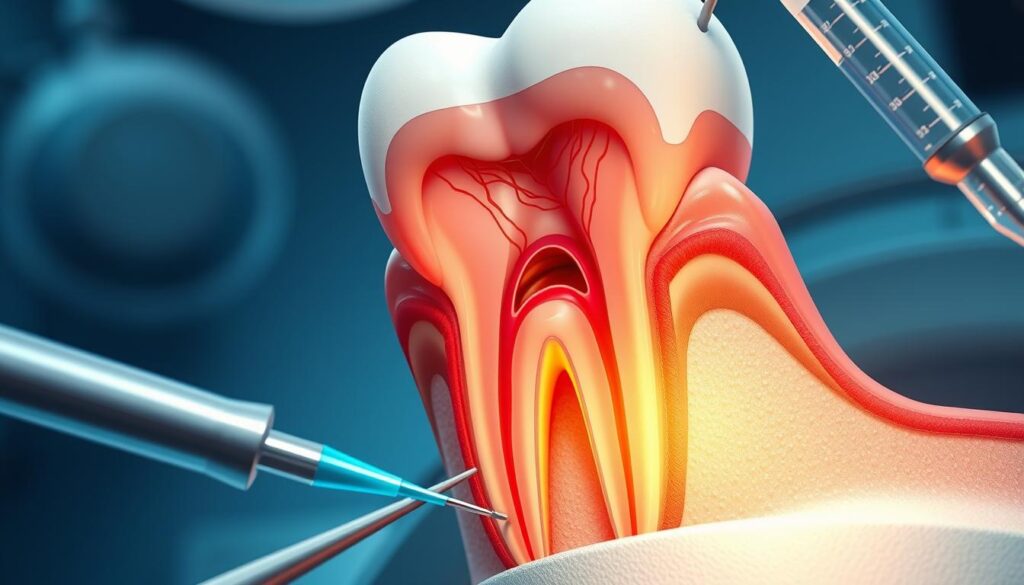
Knowing the steps of root canal treatment is key for those with dental pain or infection. Each step is important, from the first visit to aftercare. We'll look at the main steps, including dental care and recovery.
The first step is a dental consultation. Here, the dentist takes X-rays and talks about your symptoms and health history. This helps them decide if you need a root canal and how to treat you.
Before the treatment, you'll get instructions to prepare. You might learn about sedation and how to manage anxiety. You'll also be told not to eat before the procedure. This helps make the treatment smoother.
The treatment starts with a local anesthetic to keep you comfortable. Then, the dentist opens the tooth to reach the pulp. They remove the infected pulp, clean the canals, and fill them with a special material.
The dentist might use a temporary or permanent filling. The whole process usually takes one to two visits, depending on the tooth.
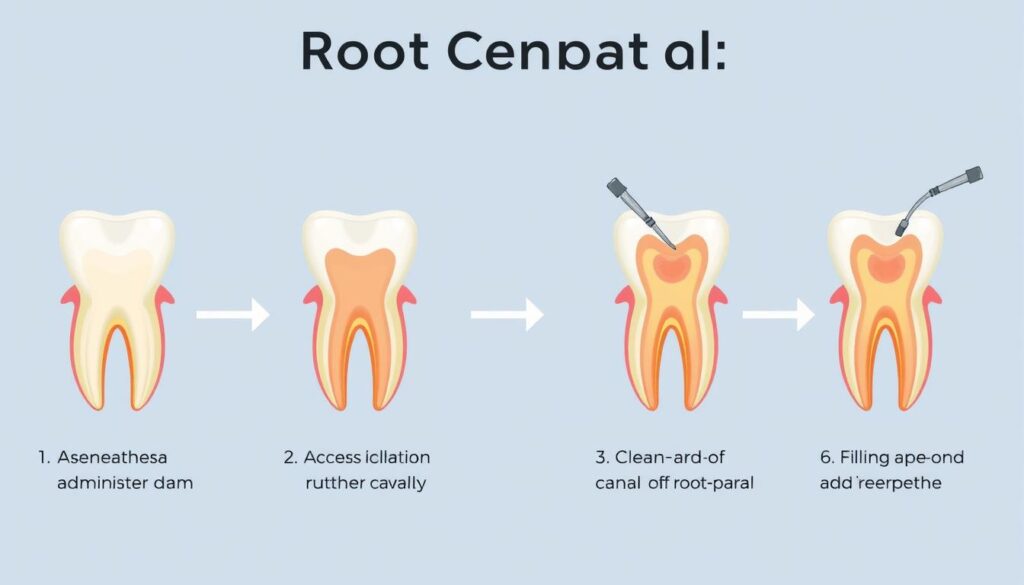
After the treatment, you might feel some pain or swelling. These are normal and can be managed with pain meds. It's important to follow the dentist's aftercare instructions.
This includes avoiding hard foods and keeping your teeth clean. A follow-up visit is also crucial to check on healing and discuss crowns. Following these steps helps ensure the treatment works well in the long run.
Learning about root canal treatment is key for those who might need it. Knowing the signs of needing a root canal helps you act fast. This early action can ease pain and keep your teeth healthy.
Root canal treatment does more than just stop pain. It helps save your tooth, keeping your bite strong. This is crucial for avoiding problems that come with losing a tooth.
Understanding root canals can make you less scared of them. Knowing what happens at each step makes the process easier. A healthy smile is important for your overall well-being, so stay informed and take care of your teeth.
A root canal treatment removes infected or damaged dental pulp. This saves the tooth from being pulled and eases pain from the infection.
Signs you might need a root canal include a severe toothache and sensitivity to hot or cold. You might also see tooth discoloration, gum swelling, or a pimple on your gums.
Most people find a root canal as painless as getting a filling. This is because local anesthesia is used to keep you comfortable.
A root canal usually takes one to two visits. This depends on how complex the case is and the extent of the damage or infection.
After a root canal, you might feel some discomfort or swelling. This can be managed with over-the-counter pain meds. It's important to follow your dentist's care instructions for recovery.
Yes, you'll need follow-up visits to check on healing and discuss options for a permanent tooth restoration. This might include a dental crown for protection.
Root canal benefits include saving a tooth from extraction and relieving pain. It also reduces the risk of more dental problems and improves your oral health.
To prepare for a root canal, talk to your dentist about sedation options. Manage any anxiety and follow instructions, like fasting before the appointment if sedation is used.